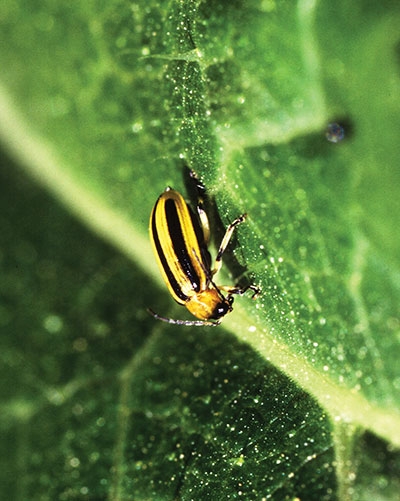
Features
Production
Research
Ozone masks plant’s volatiles, plant-eating insects confused
October 29, 2013 By Fruit & Vegetable
 The striped cucumber beetle, a predator of cucurbits.
The striped cucumber beetle, a predator of cucurbits. Increases in ground-level ozone, especially in rural areas, may interfere not only with predator insects finding host plants, but also with pollinators finding flowers, according to researchers from Penn State and the University of Virginia.
“Ozone pollution has great potential to perniciously alter key interactions between plants and animals,” the researchers said in a recent issue of Environmental Research Letters.
The insect tested was the striped cucumber beetle, a predator of cucurbits. The insects dine on the plants from the moment they emerge from the ground and when fruit forms, they eat that as well.
Jose D. Fuentes, professor of meteorology, and his colleagues tested the beetles in an enclosed Y-tube apparatus so that the insect could choose which branch to take. Researchers collected the insects from pumpkin and squash plants. They tested the insects using buffalo gourd plants, a naturally growing wild gourd that likes semiarid areas.
Separate air streams flowed into the two branches of the Y-tube.
The researchers tested the insects with all ambient air, with ambient air and ozone, with ambient air and volatile organic compounds, and with ambient air and a mix of ozone and volatile organic compounds. When presented with an ambient air or volatile organic compound airstream, the beetles chose the volatile organic compound tube 80 per cent of the time.
The researchers also tested the beetles with volatile organic compounds and a mix of volatile organic compounds and ozone. At low ozone levels, the insects showed no preference, but as ozone
levels increased, the insects increasingly preferred the ozone-free path.
While one might think that higher ozone levels in the lower atmosphere would improve crops because predator insects would be unable to find their hosts, the additional ozone would also interfere with mutualistic insect plant
responses such as pollination. ❦
Print this page